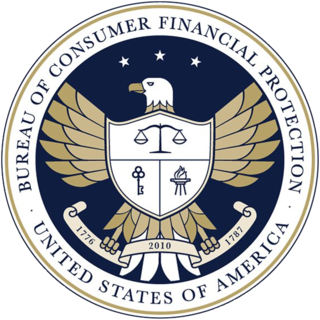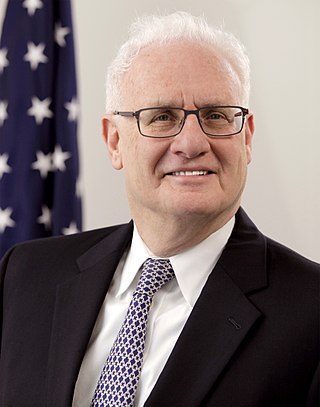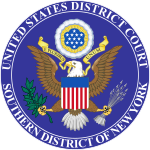
The Fair Debt Collection Practices Act (FDCPA), Pub. L. 95-109; 91 Stat. 874, codified as 15 U.S.C. § 1692 –1692p, approved on September 20, 1977, is a consumer protection amendment, establishing legal protection from abusive debt collection practices, to the Consumer Credit Protection Act, as Title VIII of that Act. The statute's stated purposes are: to eliminate abusive practices in the collection of consumer debts, to promote fair debt collection, and to provide consumers with an avenue for disputing and obtaining validation of debt information in order to ensure the information's accuracy. The Act creates guidelines under which debt collectors may conduct business, defines rights of consumers involved with debt collectors, and prescribes penalties and remedies for violations of the Act. It is sometimes used in conjunction with the Fair Credit Reporting Act.

The Fair Credit Reporting Act (FCRA), 15 U.S.C. § 1681 et seq., is federal legislation enacted to promote the accuracy, fairness, and privacy of consumer information contained in the files of consumer reporting agencies. It was intended to shield consumers from the willful and/or negligent inclusion of erroneous data in their credit reports. To that end, the FCRA regulates the collection, dissemination, and use of consumer information, including consumer credit information. Together with the Fair Debt Collection Practices Act (FDCPA), the FCRA forms the foundation of consumer rights law in the United States. It was originally passed in 1970, and is enforced by the U.S. Federal Trade Commission, the Consumer Financial Protection Bureau, and private litigants.
TransUnion is an American consumer credit reporting agency. TransUnion collects and aggregates information on over one billion individual consumers in over thirty countries including "200 million files profiling nearly every credit-active consumer in the United States". Its customers include over 65,000 businesses. Based in Chicago, Illinois, TransUnion's 2014 revenue was US$1.3 billion. It is the smallest of the three largest credit agencies, along with Experian and Equifax.

Benjamin Zachary Konop is a Senior Litigation Counsel in the Office of Enforcement at the Consumer Financial Protection Bureau in Washington, D.C. He also was a law professor and attorney in private practice.
A bad check restitution program (BCRP) is a program in the United States that works to retrieve funds from bad check writers in order to repay moneys owed to the recipients of the checks. In other words, these are debt collection operations. Many of these programs are operated by private companies that add fees that may exceed $200, regardless of the amount of the check. They call these operations "bad check enforcement," or "bad check restitution," or "bad check diversion." Sometime, these programs are actually run in house by real prosecutors. The private companies send check writers letters which state basically, that to avoid being prosecuted, the check writer may enroll in an expensive diversion program. In most instances, the prosecution threats are false and made only to coerce payment of high fees.

Loretta A. Preska is an American lawyer who serves as a Senior United States district judge of the United States District Court for the Southern District of New York. Born in Albany, Preska received law degrees from Fordham University School of Law and New York University School of Law. She practiced law in New York City from 1973 to 1992 at the law firms of Cahill Gordon & Reindel and Hertzog, Calamari & Gleason. President George H. W. Bush appointed her to the district bench in 1992. She served as chief judge of the court for a seven-year term from 2009 to 2016, and took senior status in 2017. President George W. Bush nominated Preska to the U.S. Court of Appeals for the Second Circuit in 2008, but the Senate did not act on the nomination.
The PHH Corporation is an American financial services corporation headquartered in Mount Laurel, New Jersey which provides mortgage services to some of the world's largest financial services firms. PHH is the biggest U.S. outsourcer of home loans, processes and originates mortgages on behalf of small banks and some of the world's largest financial firms, including Morgan Stanley and HSBC Holdings Plc. On October 4, 2018 Ocwen Financial completed its acquisition of PHH Corporation and PHH is now a wholly owned subsidiary of Ocwen Financial Corp.
Denise Louise Cote is a senior United States district judge of the United States District Court for the Southern District of New York.

The Dodd–Frank Wall Street Reform and Consumer Protection Act, commonly referred to as Dodd–Frank, is a United States federal law that was enacted on July 21, 2010. The law overhauled financial regulation in the aftermath of the Great Recession, and it made changes affecting all federal financial regulatory agencies and almost every part of the nation's financial services industry.

Josephine Laura Staton is a United States district judge of the United States District Court for the Central District of California.

The Consumer Financial Protection Bureau (CFPB) is an agency of the United States government responsible for consumer protection in the financial sector. CFPB's jurisdiction includes banks, credit unions, securities firms, payday lenders, mortgage-servicing operations, foreclosure relief services, debt collectors, and other financial companies operating in the United States. Since its founding, the CFPB has used technology tools to monitor how financial entities used social media and algorithms to target consumers.
Midland Credit Management is an American debt buyer and debt collection company headquartered in San Diego, California and has offices throughout the United States as well as India and Costa Rica. It is a wholly owned subsidiary of Encore Capital Group. It is one of the largest debt collectors in the United States.
Leandra English is an American political advisor serving as an advisor to the Superintendent of the New York State Department of Financial Services. She formerly was the Deputy Director of the Consumer Financial Protection Bureau (CFPB) from 2017 until her resignation in 2018. She was the plaintiff in the lawsuit English v. Trump, in which she unsuccessfully sought to have herself acknowledged as Acting Director of the CFPB.

David M. Silberman is an American government administrator who served as the Associate Director for Research, Markets, and Regulation at the Consumer Financial Protection Bureau. Silberman also previously served as the agency's Acting Deputy Director, until the appointment of Leandra English to the office.

Leandra English v. Donald Trump, et al., No. 1:17-cv-02534, was a lawsuit before the United States District Court for the District of Columbia. The plaintiff, Leandra English, alleged that the defendants, Donald Trump and Mick Mulvaney, violated 12 U.S.C. § 5491(b)(5)(B), a component of the Dodd–Frank Act of 2010, when President Trump appointed Mulvaney to be Acting Director of the Consumer Financial Protection Bureau (CFPB).

Rohit Chopra is an American consumer advocate who is the 3rd director of the Consumer Financial Protection Bureau and previous member of the Federal Trade Commission (FTC). Prior to this, Chopra served as assistant director of the Consumer Financial Protection Bureau (CFPB), a federal agency tasked with consumer protection in the financial sector. Chopra also served within the CFPB as the agency's first Student Loan Ombudsman, an office created by the Dodd–Frank Act.

Kathleen Laura Kraninger is an American government official who served as director of the Consumer Financial Protection Bureau (CFPB) from December 11, 2018, until her resignation on January 20, 2021. Before that, she served in the White House Office of Management and Budget during the Trump administration.
Seila Law LLC v. Consumer Financial Protection Bureau, 591 U.S. ____ (2020) was a U.S. Supreme Court case which determined that the structure of the Consumer Financial Protection Bureau (CFPB), with a single director who could only be removed from office "for cause", violated the separation of powers. Handed down on June 29, 2020, the Court's 5–4 decision created a new test to determine when Congress may limit the power of the president of the United States to remove an officer of the United States from office.
Collins v. Yellen, 594 U.S. ___ (2021), was a United States Supreme Court case dealing with the structure of the Federal Housing Finance Agency (FHFA). The case follows on the Court's prior ruling in Seila Law LLC v. Consumer Financial Protection Bureau, which found that the establishing structure of the Consumer Financial Protection Bureau (CFPB), with a single director who could only be removed from office "for cause", violated the separation of powers; the FHFA shares a similar structure as the CFPB. The case extends the legal challenge to the federal takeover of Fannie Mae and Freddie Mac in 2008.
Consumer Financial Protection Bureau v. Community Financial Services Association of America, Limited is a pending United States Supreme Court case related to the Consumer Financial Protection Bureau's funding mechanism.









